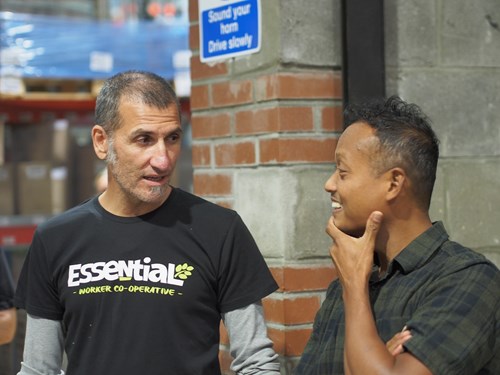Just what is a co-operative?
A co-operative is a business owned "in common" by its members. This means the members own the wealth of the co-operative together, not as individuals. Most co-operatives are worker co-ops. In this type of co-op it is the workers who are the members and who therefore own and manage the place in which they work.
Working in a co-op means taking responsibility. The workers are responsible for ensuring the co-op is organised efficiently and this responsibility provides benefits to the workers; the workers decide on produce, rates of pay, how their work is organised and what to do with any profits made. All members are expected to actively participate in setting policies and making decisions. However, the co-op is still a business. It must be able to sell the goods or services it provides and to make a profit in order to survive.

Co-operatives all over the world follow six basic principles:
- Open membership. Everyone taking part in the co-op has a right to become a full member. The conditions of membership are set out in the co-op’s rules and those fulfilling these conditions shouldn’t be refused membership on the grounds of race, sex, disability, politics or religion.
At Essential this means: all permanent workers employed over 24-hours per week may apply to become members of the co-op.
- Democratic control. All co-ops are organised on the principle of one member-one vote. No one has a greater say because of his or her length of time or investment in the co-op. Larger co-ops sometimes appoint people as managers. Where this happens, the managers are accountable to the membership.
At Essential this means: all members have an equal vote in their team meetings and at general meetings.
- Labour hire capital. In conventional businesses, control rests with the suppliers of the funds. In a co-op, control remains in the hands of those who qualify as members by the co-op’s rules. Simply investing capital in the co-op does not give any control. It is usually the case that outside suppliers of capital are repaid by means of interest rates.
At Essential this means: we can borrow money without giving any control or influence on how the business is run to those who we borrow from. The decisions about how the co-op is run are left to the members of the co-op.
- Distribution of profits. The profits of a co-op belong to all the members and they decide what to do with the profits. Options might include; sharing funds between the members, re-investing in the co-op for development purposes, or donations to charitable causes. When sharing out the profits internally, a members share depends on their history with the co-op, the number of hours worked or years as a member.
At Essential this means: we vote at general meetings on profit distribution; how much to distribute, how much to retain.
- Common ownership. In a conventional business, a member can sell their share of the company. In doing so, they sell part of their ownership and control. In a co-op, the wealth of the company is owned by the members. This wealth is held “in common” for the use and benefit of present and future members. This means, for example, that in a worker co-op, the co-op cannot be closed down unless the workers want in to happen.
At Essential this means: when a worker leaves, they cease to be a part-owner of the business. Their share may not be sold. It merely ceases to exist.
- Social and economic aims. Co-ops consider the wider needs of the community in which the members work and live. Co-ops should aim to provide a good service to their customers and to support charitable and community causes. Finally, most co-ops retain links with other co-ops. This provides mutual support and helps to promote the idea of co-operation.
At Essential this means: we support organisations such as Kiptik (which assists the Zapatista struggle), and have links with other worker co-ops such as Infinity, housing co-ops like Tinkers Bubble, and consumer co-ops (e.g. Alpha Rd).
Co‑operatives UK